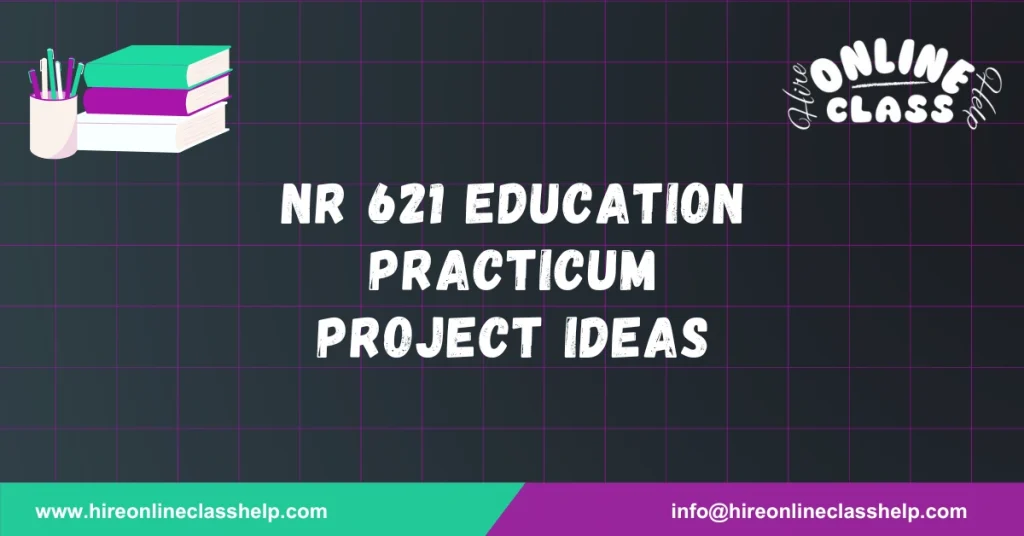






Name
Chamberlain University
NR-621: Nurse Educator Concluding Graduate Experience I
Prof. Name
Date
The purpose of this practicum project paper is to examine a critical educational issue within contemporary nursing practice. The discussion will highlight why this issue has emerged as a challenge, explain its implications for both learners and organizations, and propose an evidence-based intervention to address it. A PICOT question will be formulated to guide the investigation, supported by a theoretical framework that justifies the intervention. The focus will remain on improving the learning experiences of nursing students while aligning with current teaching needs in healthcare education.
Nurse educators in advanced practice roles encounter significant barriers in effectively teaching diverse student groups. One of the most pressing concerns today is the engagement of Millennial and Generation Z (Gen Z) learners. Millennials, born between 1981–1996, and Gen Z learners, born between 1997–2012, currently represent the majority of students in academic programs and constitute a growing portion of the nursing workforce (Beresford Research, n.d.; NJSNA Nurses Weekly, n.d.).
Research indicates that conventional lecture-based learning does not fully resonate with these generations, as they thrive in environments that incorporate technology, interactivity, and active participation (Erwin & Shatto, 2017). A lack of engagement often results in limited knowledge retention, poor motivation, and reduced ability to apply concepts in real-world practice. Conversely, when learners are actively engaged, they are more likely to achieve educational outcomes and develop essential critical thinking and problem-solving skills (Watson et al., 2019).
The following PICOT question has been developed to address the identified issue:
In Millennial and Gen Z nurse learners, will role-playing compared to traditional classroom lectures improve learner engagement in the learning process within four weeks?
| Component | Description |
|---|---|
| P (Population/Problem) | Teaching and engagement of Millennial and Gen Z learners |
| I (Intervention) | Use of role-playing as a teaching strategy |
| C (Comparison) | Traditional classroom lecture methods |
| O (Outcome) | Increased learner engagement reflected in positive evaluations |
| T (Time Frame) | Four weeks |
This structured question offers a foundation for examining how innovative strategies such as role-playing may provide more effective learning experiences compared to traditional lecture-based approaches.
Kolb’s Experiential Learning Theory (ELT) serves as the guiding framework for this project. ELT emphasizes the cyclical nature of learning, involving four phases: concrete experience, reflective observation, abstract conceptualization, and active experimentation (Watson et al., 2019). This model supports active engagement and encourages learners to immerse themselves in interactive experiences that connect theory with practice.
For Millennial and Gen Z learners, experiential strategies such as role-play align with their preference for collaboration, problem-solving, and application of knowledge in realistic settings. Fewster-Thuente and Batteson (2018) explain that concrete experiences, such as role-playing, allow learners to actively participate, reflect, and build competence in professional contexts. By incorporating ELT, this practicum project supports the transition from passive listening to active involvement, thereby enhancing knowledge retention and learner satisfaction.
The proposed intervention to address learner engagement is the implementation of role-playing activities in place of traditional lectures. Role-playing allows learners to immerse themselves in simulated clinical scenarios, fostering deeper understanding through experiential practice. This teaching strategy not only reinforces theoretical concepts but also builds communication, teamwork, and problem-solving abilities.
Research demonstrates that role-playing significantly improves learner performance, confidence, and critical thinking skills (Dorri et al., 2019). For Millennial and Gen Z learners—who value active, hands-on educational experiences—role-playing aligns with their learning styles and professional needs. By simulating real-life nursing interactions, learners can apply classroom knowledge to clinical contexts, better preparing them for practice.
Engagement is a fundamental requirement for effective learning. Nurse educators face ongoing challenges in fostering engagement among Millennial and Gen Z learners, who represent a substantial portion of today’s nursing student population and workforce. Evidence highlights that traditional lectures often fail to meet the needs of these generations, necessitating the integration of interactive approaches.
The use of role-playing as an instructional strategy, guided by Kolb’s Experiential Learning Theory, offers a promising solution. Compared to conventional lectures, role-playing fosters active participation, builds confidence, and enhances learner outcomes. By applying the PICOT model, this practicum project establishes a structured pathway to evaluate the effectiveness of role-playing in improving student engagement, with the potential to influence nursing education practices on a larger scale.
Beresford Research. (n.d.). Age range by generation. Retrieved March 9, 2022, from https://www.beresfordresearch.com/age-range-by-generation/
Dorri, S., Farahani, M., Maserat, E., & Haghani, H. (2019). Effect of role-playing on learning outcome of nursing students based on the Kirkpatrick evaluation model. Journal of Education and Health Promotion, 8(1), 197. https://doi.org/10.4103/jehp.jehp_138_19
Fewster-Thuente, L., & Batteson, T. J. (2018). Kolb’s experiential learning theory as a theoretical underpinning for interprofessional education. Journal of Allied Health, 47(1), 3–8.
NJSNA Nurses Weekly. (n.d.). What’s driving Millennial, Gen Z nurses? Retrieved March 9, 2022, from https://njsna.org/whats-driving-millennial-gen-z-nurses/
Shatto, B., & Erwin, K. (2017). Teaching Millennials and Generation Z: Bridging the generational divide. Creative Nursing, 23(1), 24–28. https://doi.org/10.1891/1078-4535.23.1.24
Watson, M. K., Pelkey, J., Noyes, C., & Rodgers, M. O. (2019). Using Kolb’s learning cycle to improve student sustainability knowledge. Sustainability, 11(17), 4602. https://doi.org/10.3390/su11174602